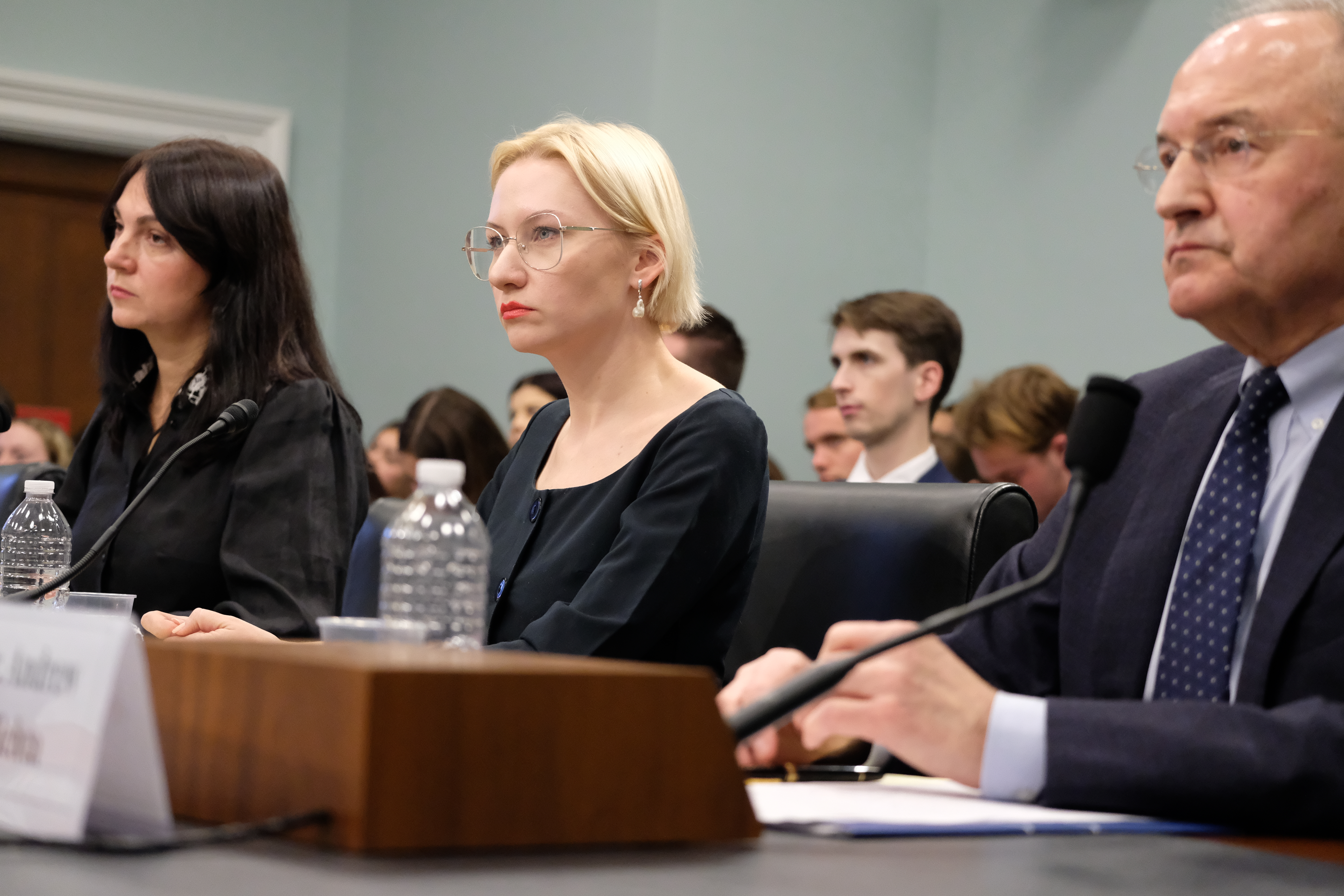"Russia's War Against Ukraine Cannot Be Considered a Problem Solely Between Ukraine and Russia". Speech by Maria Kucherenko in Washington
On Tuesday, November 19, 2024, the 1,000th day since Russia launched its full-scale invasion to Ukraine was marked by special hearings held by the U.S. Congress's Helsinki Commission. Maria Kucherenko, an analyst at the CBA Initiatives Center, was among the speakers invited to address the commission.

Below is the full text of her speech.
The very topic of these hearings points us to the core questions: what kind of response was required to address the Russian threat, and when should that response have come?
Russia’s war against Ukraine began in 2014, with the annexation of Crimea and military aggression in eastern Ukraine. Yet it wasn’t until 2022 that the global community started calling it what it truly is: Russia’s war against Ukraine, rather than framing it as a "Ukrainian crisis," as had been the norm for the preceding eight years. This mischaracterization laid the groundwork for the war’s current scale.
Russia’s war against Ukraine is not merely a bilateral conflict between two nations or even a regional issue confined to Europe. In the 21st century, there are no isolated wars. From the outset of Russia’s aggression, this became clear. The attack in the Kerch Strait underscored that Crimea and Donbas were never separate, localized issues. Then came the full-scale invasion on February 24, 2022, which shattered any illusions that Russia might stop at Ukraine.
Where Russia does not engage in direct military occupation, it destabilizes global security in other ways. Every occupied territory becomes a launchpad for further aggression—not just in Ukraine, but also in places like Georgia and Moldova. For example, during the recent elections in Georgia, we saw clear evidence of interference by Russian operatives connected to the General Directorate of the Armed Forces, better known as the Wagner Group’s "spin doctors." Alexander Malkevich, infamous for his role in meddling in the 2020 U.S. elections, is now actively involved in Russia’s newly occupied territories in Ukraine and has also been linked to electoral interference in Georgia, working on behalf of the "Georgian Dream" party.
Moldova fares no better. Russia continues to exploit Transnistria as a tool for both electoral manipulation and broader regional destabilization. This is part of a larger strategy to apply pressure not only to Moldova but to the entire security framework of the region.
One of the most vivid examples of the Russian threat in this phase of hostilities is the global food crisis. The world came to realize just how dependent many developing countries are on Ukrainian grain when Russia’s war made its transportation nearly impossible. The world also learned of Russia’s systematic theft of Ukrainian grain from occupied territories, attempting to sell it as its own. And it became clear that Russia deliberately burned and shelled Ukrainian agricultural lands, using the threat of famine as a weapon to blackmail large portions of the global population.
But food is only one of many tools of destabilization that Russia has shamelessly wielded since escalating its war against Ukraine. Russian intelligence services, often operating under the guise of so-called private military companies, help their state to support dictatorial regimes and to additionally invest in blurring the rules that would regulate the functioning of this world in a peaceful way.
Take the Wagner Group, for example. Research conducted by the "Come Back Alive" Foundation has traced Wagner’s presence—along with its affiliates in the General Directorate of the Armed Forces of the Russian Federation—to operations in over 70 countries. This includes not just militants but also propagandists, military advisers, and media operatives—spanning the full spectrum of military and non-military influence. Their name may change—Wagner, Africa Corps, or something else—but the mission remains the same: creating logistics networks designed to destabilize global security.
This strategy extends far beyond Ukraine. Russian intelligence services are deeply entrenched in facilitating arms trafficking, connecting actors like Iran, Hezbollah, and Syria. The tragic recent events in the Middle East bear their fingerprints, illustrating how Moscow builds an axis of instability: Russia-China-Iran, along with China’s proxy, North Korea. This axis doesn't just align geopolitically—it actively sheds blood across its network.
Although the focus of the Russian Federation's efforts is the subjugation of Ukraine, it does not mean that the situation of October 2023 in the Middle East will not be repeated elsewhere. Taiwan, the Middle East, Africa are all on the menu of the axis of evil.
While subjugating Ukraine remains Russia’s central objective, the implications of its actions are global. What unfolded in the Middle East in October 2023 could easily be repeated elsewhere. Taiwan, the Middle East, Africa—all are targets on the axis of evil’s menu.
This is why we must respond decisively and collectively to the complex challenge Russia poses to the world today. We cannot allow Russia to systematically violate international rules, seize more territories, and cause ever-growing human suffering. We cannot afford to "buy off" Russia by conceding individual territories or countries, hoping it will stop there. The bitter lesson of 2022—for Ukraine and the world—was that this approach fails.
Russia must also be prevented from conducting asymmetric operations that expand its global influence, including its facilitation of arms trafficking among dictatorial regimes.
Our response must be unified and grounded in the principles of territorial integrity and international law. We must affirm the force of law—not the law of force. Only by standing together can we repel the growing axis of evil.
This is the critical lesson from these thousand days of all-out war—and from the 2,926 days that preceded them, stretching back to the annexation of Crimea and the start of Russia’s aggression.
Поділитись

